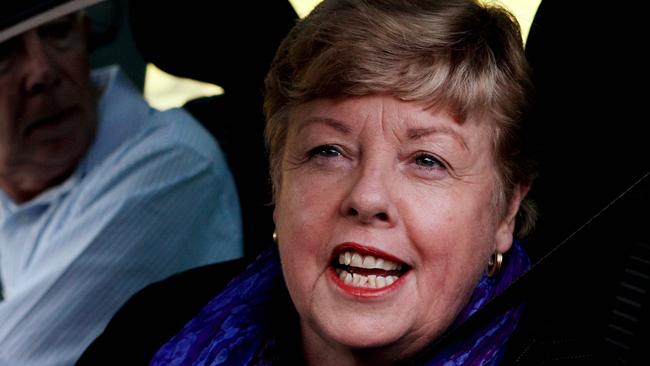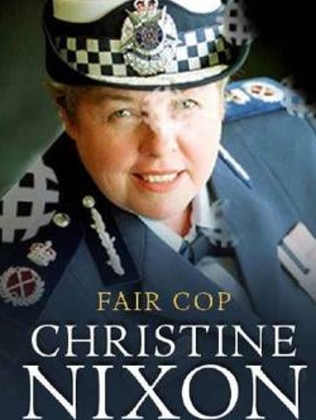
A scenario for aspiring women leaders: You are the chief commissioner of police and also hold the statutory position of State Coordinator of the State Emergency Response Plan. The temperature is 47 degrees in Melbourne, and the state is a tinderbox. Two days ago, fire chiefs warned you that the weather conditions for today would be worse than those on Ash Wednesday. Apart from making an appearance at the emergency co-ordination centre, what are some of the things you might consider doing? Should you:
(a) Go to the hairdresser;
(b) Work on your autobiography;
(c) Go to dinner at an up-market pub and leave a man in charge; or
(d) All of the above?
Next question. You come under intensive scrutiny at the subsequent royal commission for failing to disclose in your initial evidence that you left for a social engagement while the state burned and 173 people died. Do you:
(a) Complain that your cross-examination was “brutal” and “savage”;
(b) Blame your lawyers;
(c) Claim the media are picking on you because of your gender; or
(d) All of the above?

Final question. In retirement you plan to publish your memoirs. What is the most apt statement for reflecting on your leadership? Is it:
(a) “Sadly, it’s still true that women who ‘step up’ into public life have to be a bit braver than blokes”;
(b) “There was a lot of play ... on the idea of a large woman eating, leading to a ‘fattist’ commentary … as well as a feminist one’,”;
(c) “A media maelstrom that was disproportionate, and exaggerated by twisted, Byzantine agendas”; or
(d) All of the above?
Seven years after her much publicised appearances at the royal commission into the Black Saturday fires of 2009, former Victoria police chief commissioner and now deputy chancellor of Monash University Christine Nixon returns to promote her book Women Leading.
Once again, Nixon spoke of misogyny, this time pointing the finger at former Victorian premier Jeff Kennett for his criticism of her performance as chief commissioner.
“That she is now giving lectures on leadership I find an absolute affront,” said Kennett, who accused Nixon of deserting her post on Black Saturday.
Speaking to ABC host Jon Faine last week, Nixon talked of her ideal leadership “model”, and contrasted the supposed differences between men and women managers. “The tough leader who’s going to charge in on a horse and solve all the problems for us — well we think that’s not good leadership,” she said. Did Nixon begin her tenure at Victoria Police with this philosophy? A revealing excerpt from her autobiography Fair Cop suggests otherwise:
“I want a blue V8 Holden Statesman with lights and sirens,” Nixon instructed her chauffeur upon her appointment in 2001. As was pointed out to her, most of the police fleet consisted of six cylinder cars. But she was determined to charge throughout the state on the mightiest and fastest of steeds. “Frankly if you are the police chief and you need to be at a situation in a hurry and you don’t have lights and sirens, you look like a bit of a dope,” she insisted. In the eyes of your operational police officer, such displays by a chief commissioner are the equivalent of the rear-echelon general with a riding crop and a pearl-handled Colt .45.
For Nixon to detail this in her autobiography was a glaring imprudence, but not only for its ostentatiousness. Remember it was published in 2011, a year after her appearances at the royal commission. In defending her actions (or inaction), Nixon stressed her decision to leave the emergency co-ordination centre had everything to do with her delegating control to operational police and keeping an arm’s length as the agency administrator. In which case, one might ask how does that assertion sit with the Max Rockatansky impersonations?
Before Mad Max there was Maximus Decimus Meridius. In the late 1990s, having fallen out with then-NSW police commissioner Peter Ryan, the office-bound Nixon was assigned to a regional commander’s position in Sydney’s western suburbs. “I came to compare the situation to that of Roman leaders, sending their troublesome general out to far-flung wars in the provinces,” she wrote with a touch of melodrama. For someone who supposedly eschews the testosterone-fuelled style of leadership, her analogies are ironic.
In a chapter titled ‘And Peter Ryan, Thank You’, Nixon attempted to show this ‘exile’ proved the making of her in providing the operational experience she lacked. Once again, however, her eagerness to demonstrate this had the opposite effect. “I would soon find myself exercising powers that I had never used before, like having the capacity to bring in the state protection group and to give them authority to shoot somebody,” she wrote. As taught in police recruit training, there was no lawful provision then for a police supervisor to give a subordinate “authority” to shoot, nor could an officer rely on such an order as a defence to a charge of unlawful killing.
In one sense, however, Nixon was very much the pioneer, and that was in loudly accusing her critics of sexism as a means to deflect attention from her shortcomings. The lesson did not go unnoticed by then-prime minister Julia Gillard, who launched Nixon’s autobiography, and only a year later let fly with her so-called misogyny speech against then-opposition leader Tony Abbott. No doubt this met with Nixon’s approval, who last week said there had been an “orchestrated campaign” against Gillard, and that Abbott had “gone after her”. Heavens to Betsy, who else does Nixon think the opposition leader was supposed to target?
“I am coming to the view that they have been able to say things about me, and attack me, in a way that never would have happened to a man. And I am sorry to say that, but it’s true.” Sound familiar? Those were the words of the outgoing president of the Australian Human Rights Commission, Gillian Triggs, who also has plans for writing her recollections. Presumably this will focus primarily on her suffering and not on her performance shortfalls, including the delayed children in detention inquiry and the Queensland University of Technology 18C debacle.
Undoubtedly, she too will hold up her record as a shining model for women leaders of the future. If Triggs is yet to choose someone to launch her book, then I can recommend the perfect candidate.




To join the conversation, please log in. Don't have an account? Register
Join the conversation, you are commenting as Logout